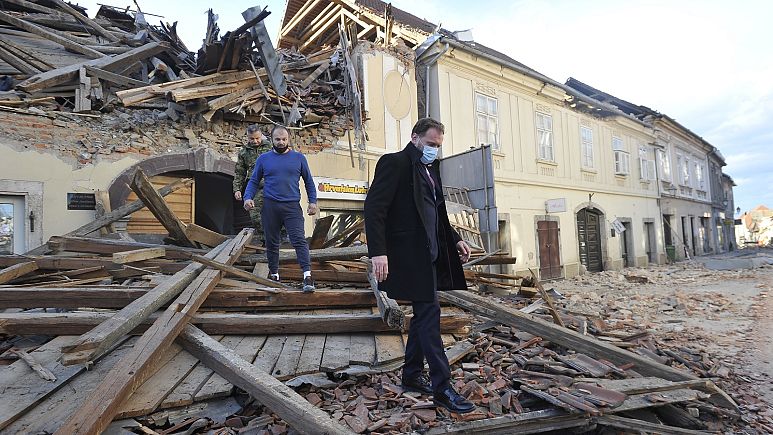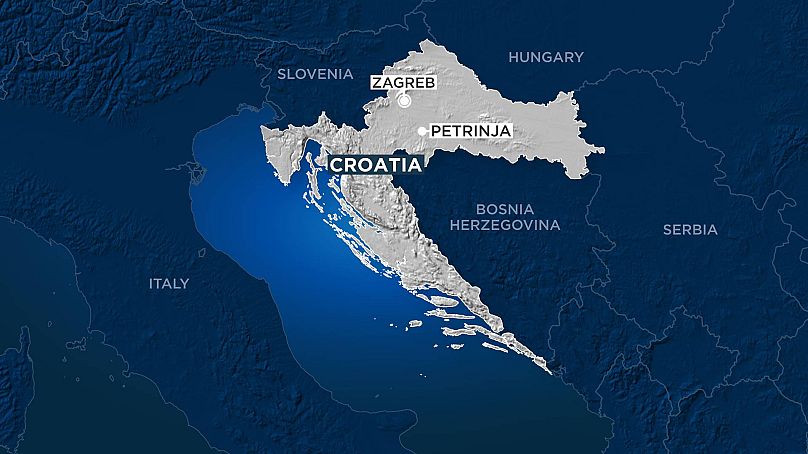Croatia earthquake: At least six dead in 6.4-magnitude tremor south-east of Zagreb
A deadly 6.4-magnitude earthquake has hit Croatia, killing at least six people and causing severe damage to the town of Petrinja south-east of the capital Zagreb.
Where did the earthquake hit?
The
European Mediterranean Seismological Centre (ECMS) said the quake hit at
12.30 (CET), with an epicentre 46 kilometres southeast of Zagreb.
How many people have been killed and injured?
At least six people, a 12-year-old girl and five men, were killed in the tremor. At least six people were seriously injured and 20 people slightly injured, the Interior Ministry said.
"I express
my condolences to the families of those killed in Petrinja and Glina in
the devastating earthquake," Prime Minister Andrej Plenković tweeted. He
visited Petrinja shortly after the earthquake.
"We hope that the number of victims will be as small as possible. All services are on the ground and work tirelessly and provide assistance to all who need it."
Earlier in the day, he said that ruins were being searched for survivors.
What was the scene like at the epicentre in Petrinja?
The quake caused widespread damage, collapsing roofs and building facades in Petrinja, home to 20,000 people.
"The biggest part of central Petrinja is in a red zone which means that most of the buildings are not usable," Plenković said.
He said the army has 500 places ready in barracks to house people, while others will be accommodated in nearby hotels and other available places.
"No one must stay out in the cold tonight," the prime minister added.
he first images from the scene showed the town shrouded in clouds of orange dust and a man and boy being pulled out alive from a car buried in the rubble. Both were sent to a hospital in an ambulance.
"We are pulling people from the cars, we don't know if we have dead or injured," Darinko Dumbović, the mayor of Petrinja, told regional broadcaster N1.
"We have dead children. It cannot be described. This is like Hiroshima," he said.
"Half of the city no longer exists. The city has been demolished, the city is no longer liveable. We need help," he added.
What else do we know?
The shockwaves from the earthquake were felt in neighbouring countries Bosnia and Serbia, and as far away as Graz in southern Austria, according to reports by the Austria Press Agency.
The same area was struck by a smaller 5.2 magnitude earthquake on Monday, causing only minor material damage, and several aftershocks were still being felt Tuesday.
The tremor comes just hours after the premier had surveyed the damage in Petrinja caused by the first quake on Monday.
While en route back to the region, Plenković tweeted the country had "mobilised all available services to help people and clear the destroyed parts".
"The most important thing now is to save human lives," he added.
What has been the reaction in Europe?
Ursula von der Leyen, president of the European Commission, tweeted that she had spoken with Plenković following the disaster, adding that the EU was "ready to support" Croatia.
The European Commissioner for Crisis Management, Janez Lenarčič, also tweeted: "We are closely following the situation on the ground in #Croatia after another #earthquake. Our Emergency Response Coordination Centre is in contact with authorities @VladaRH. We stand ready to help!"
We are closely following the situation on the ground in #Croatia after another #earthquake. Our Emergency Response Coordination Centre is in contact with authorities @VladaRH. We stand ready to help!
— Janez Lenarčič (@JanezLenarcic) December 29, 2020
Pratimo situaciju u 🇭🇷. Naš 🇪🇺 #ERCC je spreman pomoći. https://t.co/4Rbyhx5Kui
European Council President Charles Michel said the bloc is "closely following the situation in Zagreb following the devastating earthquake."
"Our thoughts go out to the injured and frontline workers," Michel tweeted.
"At this difficult time, the European Union offers its full support and assistance to the people of Croatia and Prime Minister Plenković".
What's the back story?
Earlier this year, the Zagreb area was hit by a strong earthquake that caused substantial damage. One person died in the quake on March 22 and at least 27 others were injured.
As the Balkans region sits on a faultline, earthquakes are common in Croatia but are not usually big ones. The last strong quake struck in the 1990s when the picturesque Adriatic coast village of Ston was destroyed.
Croatian seismologist Kresimir Kuk described the earthquake as "extremely strong," far stronger than another one that hit Zagreb and nearby areas in the spring.
He warned people to keep out of potentially shaky, old buildings and to move to the newer areas of the city because of the aftershocks.
Situacija u Petrinji. pic.twitter.com/apjDD2sJNE
— Hrvatski Crveni križ (@crvenikriz_hr) December 29, 2020
In the capital, people ran out into the streets and parks in fear. Many were reportedly leaving Zagreb, ignoring a travel ban imposed because of the coronavirus outbreak.
Politicians were also evacuated from the Croatian parliament building during the tremor. Some government buildings suffered damage, including the Ministry of Construction and the Ministry of Defence, according to reports by N1.
Meanwhile, in Slovenia, authorities said that the Krsko nuclear power plant, located near the border with Croatia, was temporarily shut down following the earthquake.
Source: Euronews








